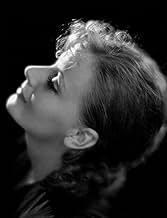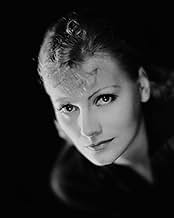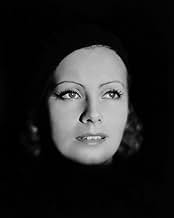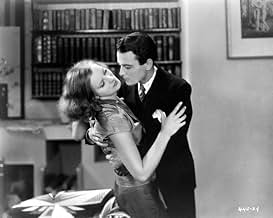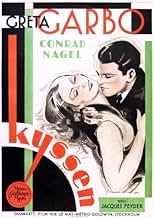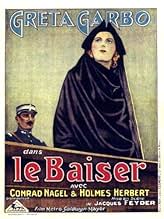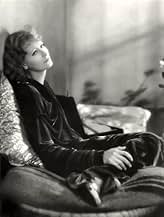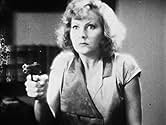CALIFICACIÓN DE IMDb
6.8/10
1.3 k
TU CALIFICACIÓN
Agrega una trama en tu idiomaAn unhappily married woman is caught up in scandal and murder when her affection toward a young man is misinterpreted.An unhappily married woman is caught up in scandal and murder when her affection toward a young man is misinterpreted.An unhappily married woman is caught up in scandal and murder when her affection toward a young man is misinterpreted.
- Dirección
- Guionistas
- Elenco
Symona Boniface
- Gossip in Museum
- (sin créditos)
Allan Cavan
- Prison Warden
- (sin créditos)
André Cheron
- Prosecutor
- (sin créditos)
Carrie Daumery
- Party Guest
- (sin créditos)
Ruth Feldman
- Scrubwoman
- (sin créditos)
Lee Phelps
- Tour Guide
- (sin créditos)
Philip Sleeman
- Lounge Lizard
- (sin créditos)
- Dirección
- Guionistas
- Todo el elenco y el equipo
- Producción, taquilla y más en IMDbPro
Opiniones destacadas
The Kiss (1929) was the final silent film produced by Metro-Goldwyn-Mayer. It was also the final silent film of stars Greta Garbo and Conrad Nagel.
The subtle acting and sophisticated (and purely visual) storytelling show how far silent cinema had come by the late 1920s. When talkies took over Hollywood, the acting regressed back to that of the stage, the background music was replaced with static hiss, and even basic film-making techniques were restrained due to the sound equipment. It would take a few years for sound technology to grow in sophistication.
Removed from its distinction as the end of an era, The Kiss is an average melodrama, especially for Garbo, who plays an unhappily married woman in love with another man. She looks luminous and acts completely with her eyes, her brilliance showing through even in material such as this. Conrad Nagel is competent in an unchallenging role, and Lew Ayres is simultaneously adorable and somewhat sinister as the young man smitten with Garbo.
The big twist is predictable and the recorded score is cheesy, using Tchaikovsky's Romeo and Juliet theme as the lovers' leitmotif, but overall, this is a skillfully made bit of melodramatic fluff, the last gasp of MGM's silent output.
The subtle acting and sophisticated (and purely visual) storytelling show how far silent cinema had come by the late 1920s. When talkies took over Hollywood, the acting regressed back to that of the stage, the background music was replaced with static hiss, and even basic film-making techniques were restrained due to the sound equipment. It would take a few years for sound technology to grow in sophistication.
Removed from its distinction as the end of an era, The Kiss is an average melodrama, especially for Garbo, who plays an unhappily married woman in love with another man. She looks luminous and acts completely with her eyes, her brilliance showing through even in material such as this. Conrad Nagel is competent in an unchallenging role, and Lew Ayres is simultaneously adorable and somewhat sinister as the young man smitten with Garbo.
The big twist is predictable and the recorded score is cheesy, using Tchaikovsky's Romeo and Juliet theme as the lovers' leitmotif, but overall, this is a skillfully made bit of melodramatic fluff, the last gasp of MGM's silent output.
This isn't the best Garbo silent ever made, but it was the last, and it was also the final silent film made by MGM. What makes this film good is the combination of Garbo's acting and the cinematography here. Movies like this and Sunrise make me somewhat sad that the silent film era ended, because what could be done creatively with the camera was lost from this point until the early 30's once the problems of the static camera got worked out and the novelty of sound at the expense of everything else wore off.
Garbo convincingly plays the sympathetic yet no-longer-in-love wife when in the presence of her husband (Anders Randolf), the longing lover who wishes to defy convention and just leave her marriage behind regardless of the consequences when with André Dubail (Conrad Nagel), and the knowledgeable "older" woman who is enjoying the attention she is getting when with the very young and naive Pierre Lassalle (Lew Ayres). Whenever she is alone she has no trouble conveying which of these three moods she is in. The story is a very good tale of tortured romance with a little bit of mystery thrown in towards the end, but the main attractions are the romance and the beautiful and creative shots. The only thing really annoying is the original Vitaphone score that went along with the movie. With all of the other subtle expression going on in this film, the choice of the theme song from "Romeo and Juliet" to convey the feelings between Garbo and Nagel every time they shared a scene just seemed a bit over the top.
Garbo convincingly plays the sympathetic yet no-longer-in-love wife when in the presence of her husband (Anders Randolf), the longing lover who wishes to defy convention and just leave her marriage behind regardless of the consequences when with André Dubail (Conrad Nagel), and the knowledgeable "older" woman who is enjoying the attention she is getting when with the very young and naive Pierre Lassalle (Lew Ayres). Whenever she is alone she has no trouble conveying which of these three moods she is in. The story is a very good tale of tortured romance with a little bit of mystery thrown in towards the end, but the main attractions are the romance and the beautiful and creative shots. The only thing really annoying is the original Vitaphone score that went along with the movie. With all of the other subtle expression going on in this film, the choice of the theme song from "Romeo and Juliet" to convey the feelings between Garbo and Nagel every time they shared a scene just seemed a bit over the top.
In Lyons, Irene Guarry (Greta Garbo) is not happy with her marriage with the old businessman Charles Guarry (Anders Randolf) and is in love with the young lawyer André Duball (Conrad Nagel). Irene knows that the jealous Charles will never give the divorce to her; therefore they decide to stop seeing each other since she does not want to be an unfaithful wife and defy the convention. André also decides to move to Paris. One day, Irene knows the eighteen year-old college student Pierre Lassalle (Lew Ayres) in a party during his vacation and she learns that the youngster is infatuated with her. By the end of his vacation, Pierre asks a photo for Irene and she promises to give one to him. Meanwhile Charles has a meeting with Pierre's father Lassalle (Holmes Herbert) and discloses that he is on the verge of bankruptcy. Lassalle promises to help his friend and they schedule a meeting in the night. When Charles goes to the encounter, Pierre arrives at his home and asks for a goodbye kiss to Irene. Meanwhile Charles does not feel well and returns home, witnessing their kiss. Charles tries to kill Pierre and later the student arrives home and tells his father that Charles is dead. Irene is arrested accused of murdering her husband. What happened in Charles's office?
"The Kiss" is a melodramatic romance and the last MGM and Greta Garbo's silent film and the debut of Lew Ayres. The movie has beautiful shots, a mystery and Greta Garbor extremely beautiful. Despite being a silent film, MGM uses sound technology with a powerful orchestral soundtrack. My vote is seven.
Title (Brazil): "O Beijo" ("The Kiss")
"The Kiss" is a melodramatic romance and the last MGM and Greta Garbo's silent film and the debut of Lew Ayres. The movie has beautiful shots, a mystery and Greta Garbor extremely beautiful. Despite being a silent film, MGM uses sound technology with a powerful orchestral soundtrack. My vote is seven.
Title (Brazil): "O Beijo" ("The Kiss")
I've got to admit up front that I have long felt that Greta Garbo was a bit overrated as an actress. All too often, she was stuck in super-melodramatic films involving either adultery or with Garbo playing an irresistible "super-vamp". While the public loved this persona, the films seemed quite derivative and clichéd. There are only so many films like this you can watch until they blend together.
Fortunately, she also made some dandy films like NINOTCHKA, QUEEN Christina and THE KISS. While superficially the film seems just like another adultery film, Garbo was given better material--as she was a woman who WANTED to commit adultery but couldn't bring herself to cheat on her much older husband. I'm glad the film didn't pursue this expected plot line but instead the film is about the consequences when the husband THINKS she's cheating on him when she isn't. This led to a dandy finale where there is a nice plot twist.
Overall, this film excelled because Garbo did NOT stare in a pained way into space as she so often did in films where she played a married woman trapped in a loveless marriage. Here, she plays a more believable and well-rounded personality--someone who seemed much more human than the usual Garbo character.
With good production values and only one minor problem (a repetitive and sappy soundtrack), this is well worth a look.
Fortunately, she also made some dandy films like NINOTCHKA, QUEEN Christina and THE KISS. While superficially the film seems just like another adultery film, Garbo was given better material--as she was a woman who WANTED to commit adultery but couldn't bring herself to cheat on her much older husband. I'm glad the film didn't pursue this expected plot line but instead the film is about the consequences when the husband THINKS she's cheating on him when she isn't. This led to a dandy finale where there is a nice plot twist.
Overall, this film excelled because Garbo did NOT stare in a pained way into space as she so often did in films where she played a married woman trapped in a loveless marriage. Here, she plays a more believable and well-rounded personality--someone who seemed much more human than the usual Garbo character.
With good production values and only one minor problem (a repetitive and sappy soundtrack), this is well worth a look.
In star Greta Garbo's silent films especially, I think the stories are secondary to the images. They tend to be similarly melodramatic romances about adultery and love triangles and the surrounding scandals and tragedies. This one is more of a love rectangle, with Garbo's husband and the characters played by Conrad Nagel and Lew Ayres all trying to possess her. It's a generic formula, especially for the vehicles of MGM's star Garbo. Yes, there's a mystery element, but that's none too appealing, either. There's even dinner-party and courtroom scenes, and, of course, her husband is an old rotund businessman. The title cards are gushy, and the musical score, including the love theme from Tchaikovsky's "Romeo and Juliet," is unoriginal. Yet, the narrative does focus in some interesting and different ways on Garbo's image, and this is yet another lovely-looking late silent film, as Garbo's 1920s MGM productions tend to be. It's fortunate that Garbo, with her foreign accent, was the last of the studio's stars to transition to talkies--this being the last silent film of both Garbo and MGM--because they're some of the most deliberately gorgeous pictures of the era. They're far superior to the awkward early talkies concurrently being made by others.
Appropriately, "The Kiss" begins with Garbo and one of her lovers in a French art gallery; from there, the film itself is a piece of visual art. Much of that is the glossy close-ups of Garbo's face, but there's an emphasis on shots of her walking and riding away from men in this one, too. There are several overhead establishing shots, superimposed images and dolly-shot transitions. The best moving camera shot is in the assault scene, with the camera pulling back after the door closes. The gunshot and phone ringing are also a better use of sound effects than in most contemporary talkies. There are two flashback scenes of this incident as narrated, or imagined, by Garbo--one is a lie and the other, presumably, is the truth. Both are filmed differently and from different angles than the first instance. The Art Deco sets are impressive, too--mainly for Garbo's home. The abstract skyscrapers design on her bedroom wall is a standout. Additionally, there's the motif of Garbo's image: Ayres wants a photograph of her, the newspapers print her image, the courtroom artists draw it, while the overall film and machinery of MGM's star making focuses on creating it. In this case, that machinery is partly of European imported artists, including Garbo herself, the director and the writer. The transition to talkies would surrender much of such foreign talent, although, fortunately, not Garbo.
With about an hour runtime, this is a relatively-brief feature and taut. For instance, when the husband has his wife tailed, it's to establish his jealous suspicions, which are sure to foreshadow later events. And when we're shown "Chekhov's gun," expect it to be fired by the end.
Appropriately, "The Kiss" begins with Garbo and one of her lovers in a French art gallery; from there, the film itself is a piece of visual art. Much of that is the glossy close-ups of Garbo's face, but there's an emphasis on shots of her walking and riding away from men in this one, too. There are several overhead establishing shots, superimposed images and dolly-shot transitions. The best moving camera shot is in the assault scene, with the camera pulling back after the door closes. The gunshot and phone ringing are also a better use of sound effects than in most contemporary talkies. There are two flashback scenes of this incident as narrated, or imagined, by Garbo--one is a lie and the other, presumably, is the truth. Both are filmed differently and from different angles than the first instance. The Art Deco sets are impressive, too--mainly for Garbo's home. The abstract skyscrapers design on her bedroom wall is a standout. Additionally, there's the motif of Garbo's image: Ayres wants a photograph of her, the newspapers print her image, the courtroom artists draw it, while the overall film and machinery of MGM's star making focuses on creating it. In this case, that machinery is partly of European imported artists, including Garbo herself, the director and the writer. The transition to talkies would surrender much of such foreign talent, although, fortunately, not Garbo.
With about an hour runtime, this is a relatively-brief feature and taut. For instance, when the husband has his wife tailed, it's to establish his jealous suspicions, which are sure to foreshadow later events. And when we're shown "Chekhov's gun," expect it to be fired by the end.
¿Sabías que…?
- TriviaMGM's last non-talking picture.
- ErroresIn the opening credits, the name André, Conrad Nagel's character, is spelled "Ardré."
- Versiones alternativasMGM also released this movie without a soundtrack, as a totally silent film.
- ConexionesFeatured in MGM Parade: Episode #1.30 (1956)
Selecciones populares
Inicia sesión para calificar y agrega a la lista de videos para obtener recomendaciones personalizadas
- How long is The Kiss?Con tecnología de Alexa
Detalles
Taquilla
- Presupuesto
- USD 257,000 (estimado)
- Tiempo de ejecución1 hora 2 minutos
- Mezcla de sonido
- Relación de aspecto
- 1.33 : 1
Contribuir a esta página
Sugiere una edición o agrega el contenido que falta

Principales brechas de datos
By what name was The Kiss (1929) officially released in India in English?
Responda
